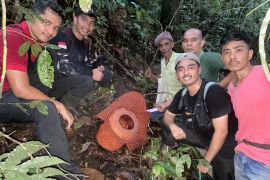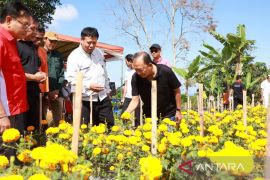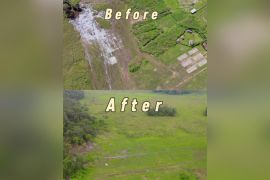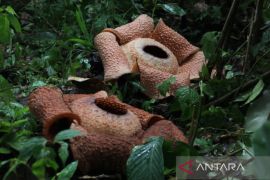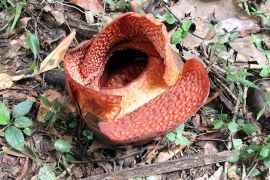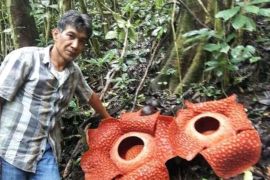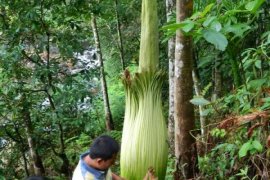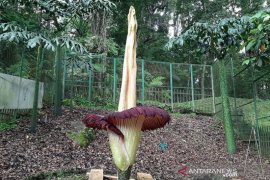This is one of the reasons why flower traders at public cemeteries in Indonesia raked in huge profits on Thursday and Friday, the first two days of Idul Fitri.
Many public and private cemeteries across the country look deserted, but on Thursday and Friday, they looked vibrant.
Many people placed flowers on graves and offered their prayers to the dead after the month-long ban on visiting graves during the holy month of Ramadan.
Hasnawati, a flower trader at Puncak Sekuning Public Cemetery in Palembang, South Sumatra, said she ran out of flowers on Thursday when hundreds of Muslims arrived at the cemetery to offer their prayers and pay their respects to the dead.
"On regular days, it is difficult to even sell ten small plastic bags of flowers, but yesterday, I managed to sell all the flowers on my stand," noted Hasnawati in Palembang on Friday.
She added that each bag of flowers costs between Rp5,000 and Rp10,000, depending on the type and colour of flowers.
"On regular days, we earn less than Rp200,000, but during Idul Fitri holidays, we earn around Rp500,000," she said.
Meanwhile, hundreds of Muslims in Rangkasbitung, Banten province, also paid their respects to the dead.
They placed flowers on the graves of their loved ones and offered their prayers to them.
Visiting holy places or graves of relatives is a traditional activity carried out on Idul Fitri in Indonesia.
Therefore, Hasan, a flower trader at Sirna Rana Public Cemetery in Rangkasbitung, said on Friday, his profits increased significantly.
"As of noon, we have earned around Rp400,000, a three-fold increase as compared to regular days," Hasan noted, adding that the demand for flowers on Idul Fitri is always high.
Visits to holy places and graves of relatives are usually made on the first day of Idul Fitri, after people organise "Halal Bihalal" gatherings with their families, relatives, neighbours, and friends to seek forgiveness.
Besides praying for their dead relatives, the visit to a graveyard is an expression of people`s gratitude to God for his protection.
Muslims in East Nusa Tenggara, Kupang, also visited the graves of their loved ones on Thursday.
They visited Oepura Muslim Public Cemetery and other burial grounds in the city on the first day of Idul Fitri to offer their prayers to the dead.
"My family brought some flowers and placed them on the graves of our relatives at this public cemetery. We will pray for them," said 35-year-old Zaenab, resident of Bonepoi, at Oepura Cemetery on Thursday.
The mother of two stated that she and her family visited the cemetery to clean their relatives` graves and offer their prayers.
"We visited the cemetery in the run-up to Ramadan, and today, we have come here again to offer our prayers to our loved ones," said Zaenab, in the company of her relatives.
Meanwhile, East Nusa Tenggara provincial government chief of religious affairs and people`s welfare bureau Mochammad Gaus mentioned that visits to public cemeteries on Idul Fitri are a part of the tradition of Muslims in Kupang.
"It is customary for Muslims here to visit the cemeteries ahead of Ramadan and after performing Idul Fitri prayers," he continued.
Gaus noted that visiting the graves of loved ones and offering prayers is recommended in Islam because it reminds visitors of death and make them realise their sins.
In Denpasar, the provincial capital of the predominantly Hindu resort island of Bali, Muslims visited a number of public cemeteries, including Wanasari, on Thursday.
"We believe more Muslims will visit the graves of their loved ones this afternoon," said Saharudin, who works at the office of Wanasari Public Cemetery for Muslims, on Thursday.
"Based on our experience, the number of people visiting cemeteries will reach the peak after Idul Fitri prayers on Thursday," Saharudin added.
According to him, thousands of pilgrims, not only from Denpasar but also from other districts such as Badung and Gianyar, are likely to visit public cemeteries on Friday.
In Sukabumi, West Java, a number of policemen were mobilised on Thursday and Friday for security reasons.
"We mobilise policemen to regulate traffic and to reduce the crime rate," said Sukabumi Police Chief Adjunct Senior Commissioner Hari Santoso on Friday.
He noted that policemen have been spread across the city to cover all public cemeteries, including Ciandam, Taman Bahagia, Taman Rahmat, Binong, and Cikundul in Sukabumi.
People can visit the graves of their dead relatives anytime, and it is advisable to place flowers on their graves this Idul Fitri. (*)
Reporter: Otniel Tamindael
Editor: Otniel Tamindael
Copyright © ANTARA 2013

